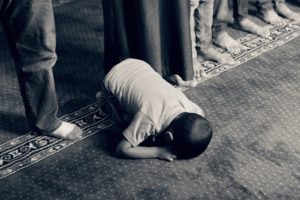Travel Ban Brief: Remember So as Not to Repeat
Written by Kathleen Flake, Richard Lyman Bushman Professor of Mormon Studies in the Department of Religious Studies, College and Graduate School of Arts & Sciences
Recently, when various anti-immigrant and anti-Muslim impulses coalesced in the President’s travel ban and were challenged in court, a friend asked if I would participate in filing an amicus curiae or “friend of the court” brief when the cases went on appeal. Such briefs are not meant to argue for or against the parties’ particular claims but, rather, draw the Court’s attention to the broader significance of the case. You could say they raise academic concerns and, as in my case, are often brought by academics. But amicus briefs are no less concerned with a case’s potential for actual harm.
In all, nineteen scholars of Mormon history signed the brief in order to lend their reputations to a reminder that a very bad history was threatening to repeat itself. In the nineteenth century, the U.S. government marshalled a variety of legal sanctions against the Mormons. These attacks were believed protective of society and included restraints on immigration. Members of the church were refused entry into the country or jailed at the border. Those who had successfully immigrated were denied citizenship and some were pressured to abandon their religion and convert to Protestantism. Eventually, the courts legitimized these laws in restraint of religion on the grounds that Mormonism was not really a religion and, therefore, not eligible for constitutional protection. In sum, Mormonism was prejudicially viewed and unconstitutionally punished in much the same way as Islam is today.
For good reason, the Supreme Court has held that it is impermissible to denominate some religion as properly American, and some not. To ban or treat differently travelers who are Muslim because they are Muslim is to send the message that, as citizens, they are “outsiders, not full members of the political communities,” as Justice O’Connor wrote. To treat Muslim refugees and asylum seekers differently from all other similarly situated persons is to treat them as lesser persons because of their religion. It is also a cruelty particularly unworthy of this nation’s ideals. A Muslim travel ban or any other kind of ban which is based solely on religious belief or association must alarm anyone who values freedom of conscience.
I confess taking a public stand against the ban didn’t take courage. I really don’t expect that, in the words of Pastor Niemoller, after they “came for” Muslims, they would come “for me.” But it seemed only common sense to begin then, before it takes courage. And, after all, one never knows: they did come for my great grandparents.
- Stay on Track: Turning Resolutions into Results
- From “Jimmy Who?” to “What Would Jimmy Do?”
- Washington’s Bold Gamble: Christmas Day 1776
- UVA Club of Pasadena: Cavs Care Gathering at the Raymond
- UVA Club of Boston: UVA Men's Basketball Game Watches
- UVA Club of Richmond: Tour of the Valentine Museum


